|
|
|
Sort Order |
|
|
|
Items / Page
|
|
|
|
|
|
|
| Srl | Item |
| 1 |
ID:
113503
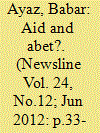

|
|
|
| 2 |
ID:
123033
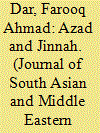

|
|
|
| 3 |
ID:
006253
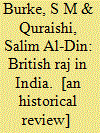

|
|
|
|
|
| Publication |
Oxford, Oxford University Press, 1995.
|
| Description |
xiv, 699p.hbk
|
| Standard Number |
0195775694
|
|
|
|
|
|
|
|
|
|
|
|
Copies: C:1/I:0,R:0,Q:0
Circulation
| Accession# | Call# | Current Location | Status | Policy | Location |
| 037502 | 954.03/BUR 037502 | Main | On Shelf | General | |
|
|
|
|
| 4 |
ID:
120056
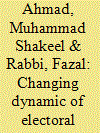

|
|
|
| 5 |
ID:
157084
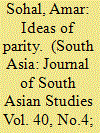

|
|
|
|
|
| Summary/Abstract |
Historians have suggested that the politics of late colonial India centred on a battle between two discrete ideas: Indian and Muslim nationalism. Complicating this binary, this paper focuses on three conceptions of parity between religious groups, contending that this logic transcended Mohammad Ali Jinnah's and the Muslim League's call for constitutional equality between Hindus and Muslims to shape a wider debate about how to defy communal majoritarianism and exit identity politics altogether. Just as Jinnah sought to prevent Hindu dominance within a single state, the Akali Sikhs—influenced as much by a negative historical imagination as the contemporary logic of numbers—produced their own constitutional claim in order to avert Muslim supremacy in the Punjab. Meanwhile Maulana Abul Kalam Azad, president of the Indian National Congress between 1940 and 1946, posited a unique thesis: since modern India was the joint construction of Hindus and Muslims, parity already existed. Though he held that Jinnah's call for constitutional parity was consequently superfluous, Azad's idea of the shared nation led him to search for a genuine consensus, rather than a simple truce, between India's two major political parties. This paper argues that the 1946 Cabinet Mission Plan, offering a degree of parity between communities whilst retaining Indian unity, represented the near-realisation of these three ideas.
|
|
|
|
|
|
|
|
|
|
|
|
|
|
|
|
| 6 |
ID:
000626
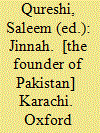

|
|
|
|
|
| Publication |
Karachi, Oxford University Press, 1999.
|
| Description |
xx,122p.Hbk
|
| Standard Number |
0-19-5778510
|
|
|
|
|
|
|
|
|
|
|
|
Copies: C:1/I:0,R:0,Q:0
Circulation
| Accession# | Call# | Current Location | Status | Policy | Location |
| 041961 | 923.25491/QUR 041961 | Main | On Shelf | General | |
|
|
|
|
| 7 |
ID:
044010
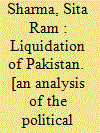

|
|
|
|
|
| Publication |
New Delhi, Raaf Prakashan, 1983.
|
| Description |
xv, 207p.hbk
|
|
|
|
|
|
|
|
|
|
|
|
Copies: C:1/I:0,R:0,Q:0
Circulation
| Accession# | Call# | Current Location | Status | Policy | Location |
| 022748 | 954.9/SHA 022748 | Main | On Shelf | General | |
|
|
|
|
| 8 |
ID:
000755
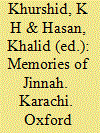

|
|
|
|
|
| Publication |
Karachi, Oxford University Press, 1990.
|
| Description |
xxviii, 91p.Hbk
|
| Standard Number |
019577406X
|
|
|
|
|
|
|
|
|
|
|
|
Copies: C:1/I:0,R:0,Q:0
Circulation
| Accession# | Call# | Current Location | Status | Policy | Location |
| 042183 | 923.25491/KHU 042183 | Main | On Shelf | General | |
|
|
|
|
| 9 |
ID:
103760
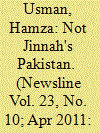

|
|
|
| 10 |
ID:
184939
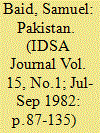

|
|
|
| 11 |
ID:
053956
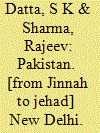

|
|
|
|
|
| Publication |
New Delhi, UBS PUblishers, 2002.
|
| Description |
xii, 348p.hbk
|
| Standard Number |
8174763996
|
|
|
|
|
|
|
|
|
|
|
|
Copies: C:1/I:0,R:0,Q:0
Circulation
| Accession# | Call# | Current Location | Status | Policy | Location |
| 045938 | 954.91/DAT 045938 | Main | On Shelf | General | |
|
|
|
|
| 12 |
ID:
086543
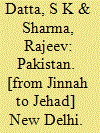

|
|
|
|
|
| Publication |
New Delhi, UBS PUblishers, 2002.
|
| Description |
xii, 348p.hbk
|
| Standard Number |
8174763996
|
|
|
|
|
|
|
|
|
|
|
|
Copies: C:1/I:0,R:0,Q:0
Circulation
| Accession# | Call# | Current Location | Status | Policy | Location |
| 054152 | 954.9/DAT 054152 | Main | On Shelf | General | |
|
|
|
|
| 13 |
ID:
163589
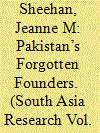

|
|
|
|
|
| Summary/Abstract |
Many nations have a short list of celebrated founders, while the contributions of many others are lost in history. An intriguing example of this narrowcasting of founders is Pakistan, where the dominant tendency has been to attribute the nation’s founding to just one man, the Quaid-i-Azam, Mohammad Ali Jinnah. The legacy of Jinnah, however, should not overshadow the contributions of his contemporaries, particularly those on the losing side of key debates or contested issues at the time. Applying lessons from research on lost founders of the USA to the case of Pakistan, this article reconceptualises what it means to be a founder. It considers why some people make the list and others do not, and then presents a case study underscoring why the words and example of one of Pakistan’s forgotten founders, Sikander Hyat-Khan, should be remembered today.
|
|
|
|
|
|
|
|
|
|
|
|
|
|
|
|
| 14 |
ID:
049171
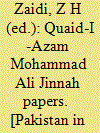

|
|
|
|
|
| Edition |
1st ed.
|
| Publication |
Islamabad, National Archives of Pakistan, 1994.
|
| Description |
cxii, 992p.: ill., mapshbk
|
| Series |
Quaid-I-Azam Papers Project
|
| Contents |
First Series - Vol. II
|
| Standard Number |
9698156062
|
|
|
|
|
|
|
|
|
|
|
|
Copies: C:1/I:0,R:0,Q:0
Circulation
| Accession# | Call# | Current Location | Status | Policy | Location |
| 038312 | 954.91/ZAI 038312 | Main | On Shelf | General | |
|
|
|
|
| 15 |
ID:
027628
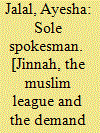

|
|
|
|
|
| Publication |
Cambridge, Cambridge University press., 1985.
|
| Description |
xiii, 310p.Hbk
|
| Series |
Cambridge South Asian Studies; 31
|
| Standard Number |
0-521-24462-5
|
|
|
|
|
|
|
|
|
|
|
|
Copies: C:1/I:0,R:0,Q:0
Circulation
| Accession# | Call# | Current Location | Status | Policy | Location |
| 025795 | 954.90420924/JAL 025795 | Main | On Shelf | General | |
|
|
|
|
| 16 |
ID:
118139
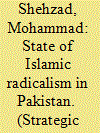

|
|
|
|
|
| Publication |
2013.
|
| Summary/Abstract |
The soil of Pakistan, because of its culture, customs, traditions, values, the temperament of the people and even state policies, provides the ideal ground for Islamic radicalism, extremism, sectarianism and terrorism. The foundation of religious bigotry and Islamic fundamentalism had been laid down in Pakistan-perhaps inadvertently-when poets like Allama Iqbal dreamt of Pakistan and the All-India Muslim League coined the term 'Two-Nation Theory' (TNT, to be read apart from an explosive that goes by the same acronym) under the leadership of Mohammad Ali Jinnah, raising the demand for a separate homeland for the Muslims of the subcontinent. At that time, the ultimate objective was to safeguard and secure the interests of the Muslim feudal lords (especially in the Muslim minority provinces of British India) and get rid of the perceived supremacy of the Hindus in a representative and democratic setup. The basic assumption that drove the demand for separation at that time was that the Muslims-namely the Shias, the Ahmadis, the Barelvis, the Ahle Hadith and the Deobandis-constituted one nation and they could not co-exist with the Hindus, the other nation.
|
|
|
|
|
|
|
|
|
|
|
|
|
|
|
|
| 17 |
ID:
111281
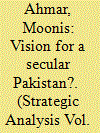

|
|
|
|
|
| Publication |
2012.
|
| Summary/Abstract |
This article will bring to light the transformation of the Pakistani state from a relatively tolerant to an unstable state dominated by militancy and violence. In the formative phase of Pakistan, the notion of religious extremism was almost non-existent as the founder of the country, Quaid-e-Azam Mohammad Ali Jinnah, made it clear that the new state would not be theocratic in nature. However, after his demise on September 11, 1948, his successors failed to curb the forces of religious militancy that not only changed the nature of the Pakistani state but also succeeded in making it a monolithic religious state in which non-Muslims were disqualified from seeking the highest positions in the state structures. This article also aims to examine the vision for a secular order in the context of Pakistan while relating it to the management of conflicts.
|
|
|
|
|
|
|
|
|
|
|
|
|
|
|
|
|
|
|
|
|